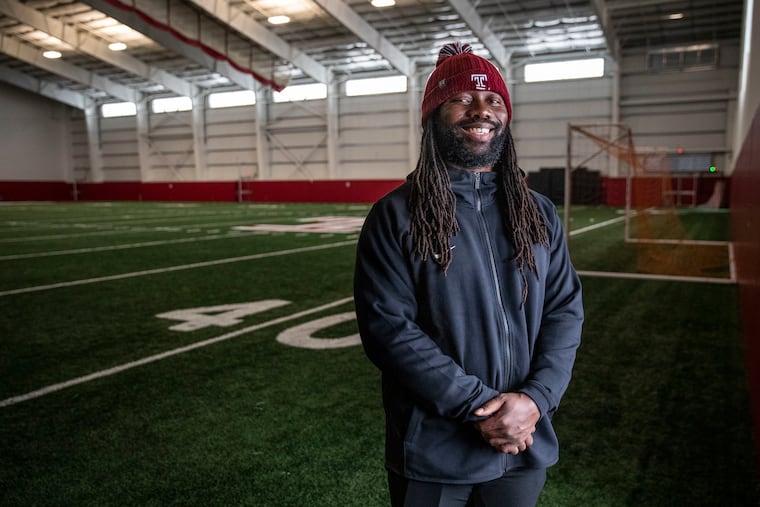‘Time to shine’: Prince Moody and Temple athletes strive to bring diversity and equity to the forefront on North Broad
Moody took over as associate athletic director of DEI in July, along with the role as Student-Athlete Advisory’s new advisor.

Prince Moody sat in the back row of a Student-Athlete Advisory Committee meeting in Pearson McGonigle Hall, his second gathering as Temple’s new director of diversity, equity and inclusion.
He quietly typed away notes on his computer as he allowed leaders among athletes to guide the conversation.
That’s how he prefers it.
Midway through the meeting, SAAC president and Temple gymnast Jackie Terpak gestured for Moody to introduce himself to the group.
“It’s your time to shine,” Terpak said.
After briefly explaining his background, mission and goals for better understanding what he calls the “student-athlete experience,” Moody sat right back down, gesturing for the SAAC executive board to continue running the meeting.
Moody isn’t a hands-off leader, nor is he a distant adviser. He’s trying to listen and learn in his first few months. Terpak described him as the type of adviser who lets the students drive the conversation because he values the work they do.
“I think our voices are being heard because those conversations honestly started within the students. It wasn’t by the administration,” Terpak said. “Now we’re seeing it go to administration with our new president [Jason Wingard] and our new athletic director [Arthur Johnson]. We’re seeing it evolve and come from admin now.”
Moody took over as associate athletic director of DEI in July, along with the role as SAAC’s new adviser. He brought with him a wealth of experience to the role at Temple.
The DEI position itself is a new one in the Owls’ athletic department in response to the conversation started by athletes.
Temple SAAC and interested athletes took the initiative to start “Owls for Justice” after the unjust killings of George Floyd, Ahmaud Arbery, and Breonna Taylor in 2020. The student-led organization set out to advocate for racial equality and social justice on and around campus.
Three months later, Temple athletics organized a 22-person DEI committee made up of various coaches and staff members, including deputy AD Craig Angelos, associate AD of Compliance Kristy Bannon Sromovsky, and associate AD of mental health Stephany Coakley.
“It shows they’re listening,” said Manny Ikeocha, a freshman soccer player and SAAC director of DEI. “Things are always going to change. If we have people in high places making decisions that aren’t listening to their student-athletes, then nothing is going to go right for us or the university. I think they’re adapting well to the changes.”
In large part, Moody was hired to expand upon those foundational conversations and apply his expertise to create comprehensive programs that improve the sense of community across the athletic department.
“The reason why I’m here is because of the work they did before me,” Moody said. “Last year allowed the athletic department to examine what was going on. I think Temple did a really good job of taking accountability, like, ‘Hey, we can get better and we want to get better.’”
Moody previously served in the support services office for athletes at Ohio State. Before that, he worked in athlete development at his alma mater, Wisconsin, where he played defensive back from 2005-09.
He was involved with an athlete-led program called Beyond the Game at Wisconsin, emphasizing leadership, communication and self identity. With the Buckeyes, he worked alongside Redefining Athletics Standards, a student organization connecting and giving a voice to Black male student-athletes.
The latter was organized in response to a 2018 story in the Lantern, Ohio State’s student newspaper, that revealed the low enrollment rates of Black male students. Moody helped spark a conversation that bridged the gap between athletes and advisers, similar to the genesis of Owls for Justice.
“A few years ago people didn’t feel as free to speak. No matter how much [former SAAC adviser Olivia Wynn] might have said, ‘Use your voice.’ It wasn’t a norm,” Terpak said. “I feel like more people back then thought it would be complaining, the conversations that we’re having.”
Moody’s goal is to better understand Johnson and Wingard’s vision for the future of the department, and figure out how he can become an extension of what they want to accomplish.
They will start by engaging the North Philly community — which surrounds the campus — and getting people out to games while building relationships with local entities. Moody saw Ohio State’s Olympic sports teams play in front of sold out crowds — something he envisions for Temple.
Temple intends to run a university-wide climate survey in January for students and staffers, according to Moody. Having a helping hand in that while learning more about the university’s objectives will help Moody better fulfill his new role.
“I don’t know what I don’t know. That’s the challenge,” Moody said. “The challenge is getting to know Temple and getting to know the community.”